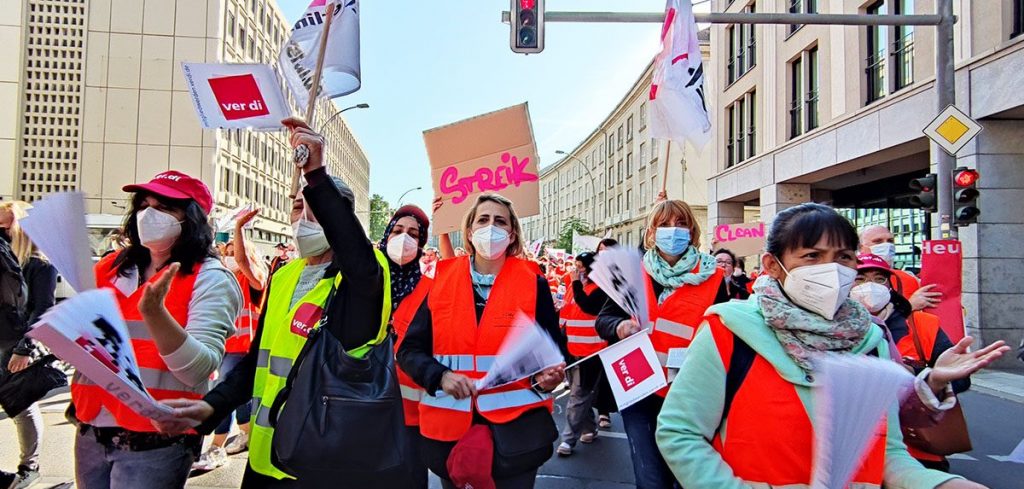Originally published in Exberliner.
In the last 18 months, the world has learned to appreciate healthcare workers – everyone, that is, except hospital administrators and politicians. Doctors, nurses and all the other workers who keep clinics running have gotten lots of applause. Some have even received one-time bonuses of a few hundred euros. But even before the emergence of Covid-19, working conditions were catastrophic, and they’ve only gotten worse. Applause doesn’t pay the rent.
The problem isn’t pay, even though pay is terrible. The main problem is the lack of staffing. Imagine doing an eight-hour night shift all by yourself – that means being responsible for 30 patients at a time. What if two of them have a crisis at the same time? This is normal for nurses at Berlin’s biggest hospital. Is it any wonder that in Germany, trained nurses are abandoning their profession in droves?
Endless appeals to politicians have gone nowhere. That is why healthcare workers are striking. Since last Thursday, nurses and service workers at Berlin’s biggest employers – the Charité and Vivantes hospitals — have been on strike together. They have two main demands:
The first is Entlastung, which could be translated as “relief,” while in the United States healthcare workers call for “safe staffing ratios.” What this means is that management agrees on a minimum number of workers for each station. If not enough workers are available, the station needs to be closed. This is about basic safety.
The second demand is TVöD für alle, which means “equal pay for equal work.” Nurses at Charité and Vivantes are paid according to a union contract – the Tarifverträg für den Öffentlichen Dienst – that covers two million public-sector workers. That contract applies to everyone in the hospitals.
Except: Berlin’s public hospitals were broken up as part of neoliberal reforms 15 years ago. Now, wholly-owned subsidiaries are responsible for cleaning, cafeterias, laboratories, maintenance, laundry, etc. Workers of these companies – which are owned by the hospitals and ultimately by the Berlin government – are outside the union contract. A maintenance worker at such a subsidiary might make €800 per month less than a maintenance worker employed directly by the hospital – even though they work side by side.
If you look at the election posters all over Berlin, you might wonder why there is a strike at all. The SPD, the Greens, and Die Linke are all calling for more money for healthcare workers. But who has been in government in Berlin for the last 20 years (with minor variations)? These three parties. It was SPD and Die Linke who were responsible for outsourcing and union busting in the 2000s. Five years ago, the “red-red-green” coalition promised they would finally reverse this decision. But nothing has happened.
This is not just a workers’ movement – it’s a women’s movement
In the election campaigns, these parties are again promising something they have consistently refused to deliver. They tell us it is “complicated.” Cutting wages at hospitals was easy – but they claim that raising them again will take decades.
Hence the strikes. There have been many strikes at Berlin’s hospitals over the last decade, but this is the first time that a strike has been unlimited (i.e. without a fixed end date) and the first time since 2011 that workers from the “mother corporation” and the “daughter companies” (as they are called in German) have been striking together. Strikes at a hospital are incredibly difficult – it is amazing they have been going on for eight days now.
This is not just a workers’ movement – it’s a women’s movement. The majority of healthcare workers are women, and, under patriarchy, “women’s work” is always underpaid. When the SPD, the Greens, or Die Linke claim to be feminists, they can be judged based on how they treat nurses.
2,500 workers and their supporters came to a demonstration on Tuesday afternoon. Among loud techno music and lots of confetti, one worker after another emphasised: “It can’t go on like this!” The conditions at hospitals make it impossible for them to do their jobs. That’s why they are getting support from both doctors and patients. Everyone suffers when hospitals are understaffed – everyone, that is, except for administrators who get bonuses for cutting costs.
“Capitalism, get out of the clinic!” – that slogan was chanted again and again. Nurses don’t have time to treat patients because they are busy with “medical coding” and paperwork to keep the money flowing. Even public hospitals are run with neoliberal mechanisms.
This is not just about healthcare, either. At the same time the hospitals were being semi-privatised in the 2000s, the German and Berlin governments were also handing housing companies and the railway system over to the market. Even now, the Green Party is attempting to privatise the S-Bahn.
Right now, we are seeing social struggles against the rule of investors. There are strikes by train drivers. There is the campaign to expropriate big landlords. People are demanding that healthcare, transport and housing return to public control. These are all basic human needs, and they shouldn’t be subject to demands to maximise profits. That is why all of these struggles deserve support: our lives are more important than their profits!











